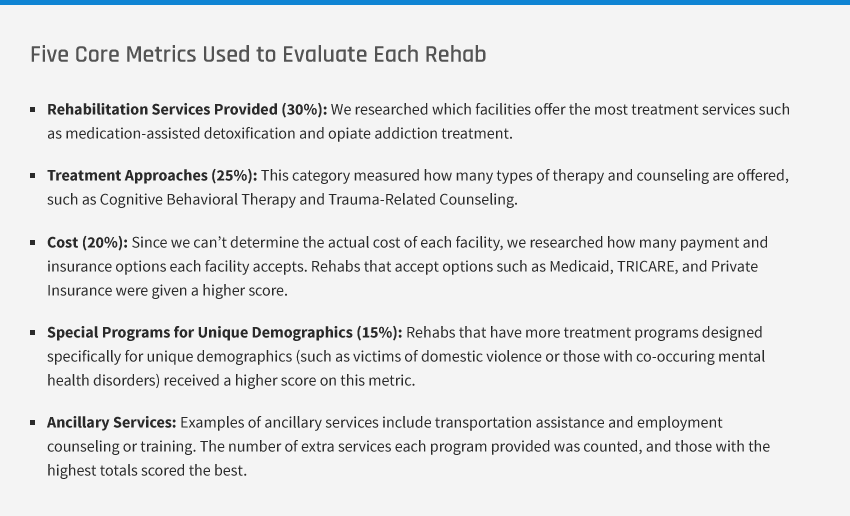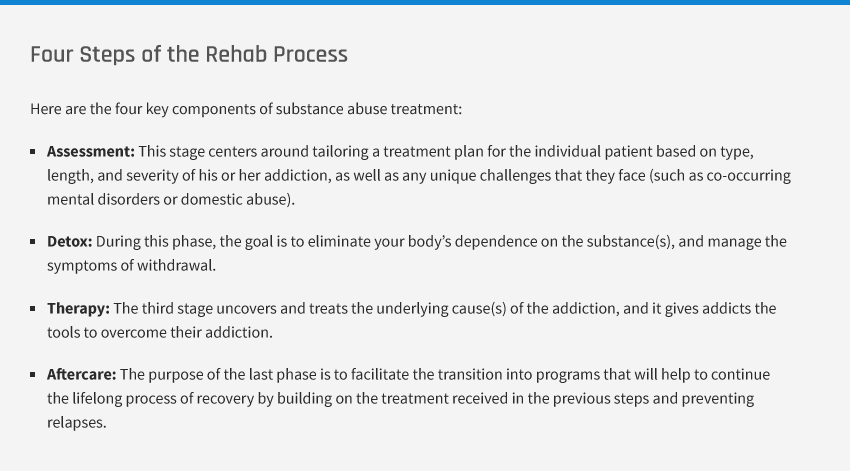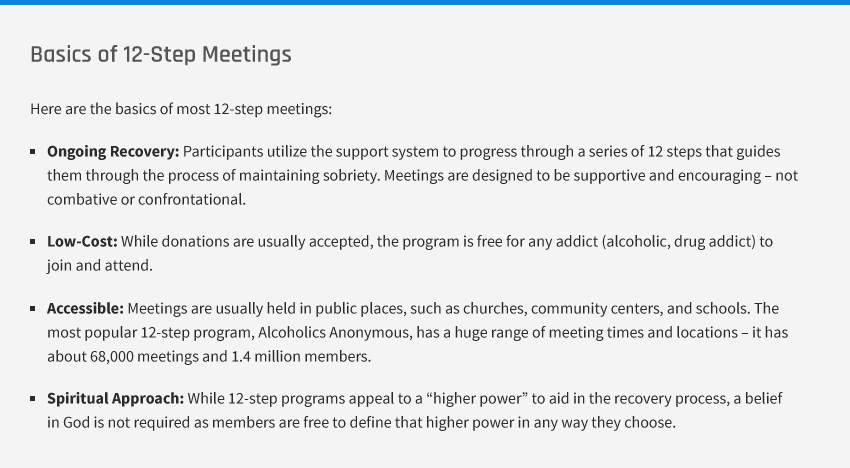Since alcohol is legal, socially acceptable, relatively inexpensive, and widely available, it is, unsurprisingly, a commonly abused substance. A 2016 Florida Department of Health survey revealed that in 16.4% of adults in Collier County engaged in heavy or binge drinking. While this rate is concerning, it is still 1.1% lower than the state average for heavy and binge drinking among adults. Additionally, the percentage of Collier County adults taking part in heavy and binge drinking decreased from 19.2% in 2010 to 16.4% in 2016. Conversely, this percentage among all adults in Florida increased during the same time period, from 15.0% in 2010 to 17.5% in 2016.
Alcohol, Drug, and other Rehab Centers in Naples, FL
TABLE OF CONTENTS
Getting Help
What to Consider When Choosing a Rehab Center
When exploring treatment options and rehab programs, asking the following questions can help you clearly understand your choices:
- Which service setting do I need? Read the following guides for information on residential inpatient programs and outpatient programs.
- Am I going to benefit from a specialized rehab program? Explore the differences between holistic rehabs, rehabs for dual diagnosis, and programs exclusively for alcohol and drug detox.
- How long should I stay? Consider the benefits of a shorter rehab length (30 days) or a longer-term option (60, 90, or 120+ days).
Different aspects of your life, such as the severity of your addiction, your financial position, and your unique personal circumstances, will influence your options.
For more information that will aid your decision-making process, read our guide to Choosing the Right Rehab.
The Best Rehabs in Naples, FL
The cost of rehab can be high, depending on your needs and your specific location. Regardless of your financial status and insurance coverage, there are ways to find help to break free of your addiction. According to the Substance Abuse and Mental Health Administration (SAMHSA), there are five substance abuse treatment centers within 25 miles of Naples. These organizations typically strive to provide substance abuse recovery services to residents, regardless of their financial status. Out of these five rehabs, the Horseshoe Drive Satellite of the David Lawrence Center has received the highest overall scores based on our five core metrics.

We evaluated the quality of the following facilities using these core metrics. Please feel free to read a full breakdown of our filtering process and ranking methodology for more information.
1. David Lawrence Center: Horseshoe Drive Satellite
The Horseshoe Drive Satellite location of the David Lawrence Center earned 5.5 points out of 10 possible points for its excellent holistic outpatient substance abuse treatment services in the heart of Naples. Patients can find medication-assisted treatment (MAT) for both opioid and alcohol addiction at this location and can take comfort in knowing that MAT is always accompanied by a dual focus on overall health care and counseling to promote both the physical and mental well-being and healing of the whole person.
This satellite location cooperates with the Collier County Sheriff’s Department in the administration of a special program that diverts clients with substance abuse and mental health issues into its treatment program. These clients would otherwise serve prison time for drug possession or similar violations but are, instead, given a fresh start through recovery.
Treatment approaches available at this center include cognitive behavioral therapy, dialectical behavioral therapy, trauma-related counseling, rational emotive behavioral therapy, and more.
As a holistic center, the Horseshoe Drive Satellite strives to meet a variety of patient needs through its ancillary services, including employment training and counseling, health education, transportation assistance, domestic violence services, nicotine cessation services, and much more.
The David Lawrence Center also strives to keep its cost low, accepting Medicaid and other federal and government funding, Medicare and other state-financed health insurance plans, private insurance, TRICARE, other forms of federal and government funding, and self-payment on a sliding scale. For most patients, lack of income should not be a barrier to receiving services at this location.
- Rehabilitation Services Provided: 3.84
- Treatment Approaches: 9.1
- Cost: 6.66
- Special Programs for Unique Demographics: 2.08
- Ancillary Services: 3.39
2. David Lawrence Center: Immokalee Satellite
The Immokalee Satellite, the second of three locations of the David Lawrence Center around Florida, scored 5.1 points out of 10 points in our rankings. This location aims to bring services further inland for those who do not live near the David Lawrence Center in Naples. At the Immokalee Satellite, patients struggling with substance abuse can receive proven medication-assisted treatment (MAT) to help them resist craving illicit drugs. Moreover, patients can connect with outpatient counseling that uses treatment approaches such as cognitive behavioral therapy, trauma-related counseling, anger management, motivational incentives, and more, to address their substance abuse and related mental health needs.
The Immokalee Satellite may accept patients referred from the court system in some cases, but, for the most part, this center does not offer special programs tailored to specific populations. Regardless, this center’s staff is well-trained to compassionately address physical, emotional, and social needs as they manifest in patients. Most patients will find this center to be a good fit due to its thorough, holistic approach to recovery.
The Immokalee Satellite offers many ancillary services, including health and drug screenings, health education, social skills development, community outreach, smoking cessation services, domestic violence services, and more. Patients can cover the cost of their treatment using a wide variety of options, including self-payment on a sliding scale, Medicaid and other state-financed insurance plans, TRICARE, and Medicare. Like the Horseshoe Drive Satellite, this center is a non-profit and does its best to keep services affordable even for those patients with limited income.
- Rehabilitation Services Provided: 4.62
- Treatment Approaches: 7.28
- Cost: 6.66
- Special Programs for Unique Demographics: 0.0
- Ancillary Services: 5.61
3. SalusCare: Ortiz Campus
SalusCare’s Ortiz Campus, with an overall score of 4.2 out of 10 points, offers a flexible array of outpatient substance abuse treatment options in Fort Myers. Both adult and adolescent patients can receive a completely free assessment at this center during posted walk-in hours. SalusCare uses medication-assisted treatment (MAT) for patients with opioid addiction. To aid in the substance abuse recovery process, patients also participate in therapy that draws on a variety of treatment approaches, including but not limited to cognitive behavioral therapy, dialectical behavioral therapy, trauma-related counseling, and 12-step facilitation. Patients with co-occurring mental health disorders will find this center especially beneficial for their recovery.
To support patients in their substance abuse recovery, SalusCare offers a variety of ancillary services to promote long-term success, including drug and alcohol testing, mental health screenings and services, aftercare planning, peer-support groups, family counseling, and more. This center prioritizes the admission and treatment of pregnant and postpartum women, women with children, and persons who inject drugs, due to the especially high risks associated with substance abuse among these groups. In some cases, pregnant women may even be eligible for free treatment.
SalusCare accepts many forms of payment, including Medicaid and other state-financed insurance plans, TRICARE, private insurance, and self-payment on a sliding scale according to financial need.
- Rehabilitation Services Provided: 2.31
- Treatment Approaches: 6.37
- Cost: 5.55
- Special Programs for Unique Demographics: 3.17
- Ancillary Services: 3.3
Top-Rated, Low-Cost Treatment Centers in Naples
| Rank | Rehab | Total Score | Contact Information |
| #1 | David Lawrence Center: Horseshoe Drive Satellite Services | 5.5 | 2806 South Horseshoe Drive Naples, FL 34104 Main Tel: 239-263-4013 |
| #2 | David Lawrence Center: Immokalee Satellite Services | 5.1 | 425 North First Street Immokalee, FL 34142 Main Tel: 239-657-4434 |
| #3 | SalusCare: Ortiz Campus | 4.2 | 2789 Ortiz Avenue Fort Myers, FL 33905 Main Tel: 239-275-3222 |
Finding a Substance Abuse Treatment Center in Naples
Start by determining your coverage
The process of determining your best rehabilitation options will go most smoothly if you begin with a clear understanding of your insurance coverage. Reach out to your private or healthcare marketplace insurance provider for details on what kind of centers you are able to utilize. If you would like to know if you qualify for low-income Medicaid services, visit Florida’s Agency for Health Care Administration and reach out to the appropriate contacts. Regardless of the kind of coverage you have, public and private insurance companies must cover substance abuse treatment for qualified individuals.
Use our database to find a treatment center near you
The tool below lists all of the Florida treatment centers that the Substance Abuse and Mental Health Services Administration (SAMHSA) recognizes. By inputting your zip code and using the available filter icons, you can find relevant treatment centers near you.
Schedule an assessment
Having your needs assessed by a qualified individual, usually a certified therapist or counselor, will be your first step in receiving treatment. An assessment is typically required by the insurance provider. The facilities included in our guide can provide an assessment, or you can approach your primary physician for an assessment referral. Contact companies in our database above to find out if they will provide this service.
Find a Rehabilitation Facility Near You
Filter Your Search
Popular Searches
Type Of Care
Treatment Approaches
Service Setting
Age Groups Accepted
Ancillary Services
Facility Operation
Facility Smoking Policy
Gender Accepted
Language Services
License Certification Accreditation
Payment Assistance Available
Payment Methods and Insurance Accepted
Special Programs Groups Offered
What to Expect in Rehab
Addiction treatment is a multifaceted industry, and leaders in the field have created numerous techniques and philosophies for treatment. As a result, the science of studying addiction is constantly shifting and improving. Despite differences in the styles of therapy that are available, the core elements of rehabilitation are very similar.

For more on what to expect in rehab, read our guide on the addiction rehabilitation process.
Finding Aftercare in Naples
The rehabilitation process is a lifelong venture, and proper aftercare greatly decreases the chances of relapse upon release from a treatment facility. The same form of aftercare is not practical for everyone, but, luckily, aftercare comes in a variety of forms to meet different needs. Follow-up visits for continued therapy, sober living homes, and group therapy are a few common options. Research shows that long-term participation in aftercare activities dramatically improves the outcome of rehabilitation efforts.
Alcoholics Anonymous, a national addiction support group, created the 12-step process for recovering from alcohol addiction. Today, there are many other resources that model treatment on a similar framework, including Narcotics Anonymous, or NA, for those struggling with drug addiction.

Contact the appropriate local organization to find an AA or NA meeting near you
To find organizations that can help you find local Alcoholics Anonymous (AA) or Narcotics Anonymous (NA) group meetings, see our directory below. Since meeting times and locations change from time to time, it is best to call ahead to ensure the posted information is accurate.
Alcoholics Anonymous (AA) and Narcotics Anonymous (NA) Database
| Name | City | Program | Telephone | Spanish Hotline |
|---|
Sober Living Homes
In the supportive yet challenging environment of a sober living home, persons who have completed substance abuse treatment continue to evolve into functional members of society. Zero-tolerance policies towards drugs and alcohol create a safe place for those in the early stages of recovery. Sober living homes foster both relationship skills and employment skills, and they strongly encourage recovering addicts to look beyond their addiction and cultivate hope for a new life. Research shows that when persons in recovery integrate into communities such as these, it incentivizes productivity and makes them more likely to break free of the cycle of substance abuse.
Low rent costs and chores are often assigned to residents of sober living homes, who are expected to attend support groups in each home during their stay as well. These homes usually welcome residents for anywhere from a few months to several years, as long as they maintain their sobriety and abide by house rules.
You can find sober living homes in or near Naples by checking our database, or you can select the appropriate filter from our tool above. Alternatively, you can head to our guide on sober living homes and learn more about them, as well as search for a certified recovery residence in your area.
Substance Abuse in Naples
Collier County youth use less cannabis but more alcohol than the state average
It is important for local institutions to be informed on and proactive about combating youth substance abuse because those who begin using potentially addictive substances during adolescence are at an increased risk of developing substance use disorders and mental health issues throughout adulthood. The comprehensive 2016 Florida Youth Substance Abuse Survey released by the Florida Department of Children and Families revealed that high school students in Collier County face slightly different challenges than the same demographic in other parts of Florida.
In 2016, a troubling 29.4% of Collier County high school students self-reported current use (within the past 30 days) of alcohol, a percentage that was 4.2% higher than the percentage of high school students across Florida who participated in the same behavior. Furthermore, while not all minors engage in binge drinking, 12.6% of Collier County high school students did take part in this dangerous activity. The percentage of high school students in Collier County who engaged in binge drinking was 1.7% higher than the state average for high school students. Considering the risks of underage drinking, and binge drinking, in particular, these statistics are alarming. However, an encouraging finding of the report indicated that Collier County high school students used cannabis products 1.4% less than the state average among the same population: 15.6% of Collier County high school students used cannabis products in 2016, compared to 17.0% of high school students across the state.
Current Substance Abuse Among High School Students in Collier County and Florida, 2016
| Any Alcohol Use | Binge Drinking | Cannabis Products | |
| Collier County | 29.4% | 12.6% | 15.6% |
| Florida | 25.2% | 10.9% | 17.0% |
For comparison, it’s interesting to note that 16.8% of Collier County high school students self-reported in 2016 that they currently engage in vaping, revealing that more of the county’s high school students participated in vaping than those who abused cannabis products. Minors are not legally allowed to purchase vaping paraphernalia in Florida, and the long-term negative health effects of vaping are now beginning to be further studied and understood.
Rates of heavy and binge drinking are decreasing among adults in Collier County
16.4%
Adults engaging in heavy or binge drinking in Collier County, 2016
17.5%
Adults engaging in heavy or binge drinking in Florida, 2016
The decrease in heavy and binge drinking among Collier County adults is a positive sign for the future health of the county. Currently, the number of deaths attributed to alcohol-related liver disease in Collier County is much higher than the state average; however, if excessive drinking behaviors continue to decrease, the county will eventually see a decrease in deaths due to alcohol-related liver disease as well.
Unfortunately, over the last several years, the long-term trend for deaths caused by alcohol-related liver disease in Collier County has been a series of spikes and drops without a clear pattern of decrease: Between 2008 and 2017, the prevalence of these deaths reached their highest rate of 11.5 per 100,000 deaths in 2013, while the lowest recorded rate was 5.1 per 100,000 deaths in 2009. In each year from 2008 to 2017, Collier County’s rate of deaths due to alcohol-related liver disease has sadly been higher than the rate for all of Florida. In 2017, for example, the prevalence of deaths caused by alcohol-related liver disease was 1.7 per 100,000 deaths higher than the state average.
Collier County has a heightened level of drug and alcohol-induced deaths compared to the nation
13.06%
of Collier county deaths are caused by drugs and alcohol
12.71%
of U.S. deaths caused by drugs and alcohol
Between 2008 and 2017, 13.06% of deaths in Collier County were caused by drugs and alcohol. Of the 4,511 deaths during this time frame that were drug and alcohol-induced, 82.67% of the deaths were caused by drugs, and 17.33% of the deaths were caused by alcohol.
Analysis of the most recent data suggests that drug and alcohol abuse trends in Collier County may be taking a more positive turn. The percentage of Collier County deaths induced by drugs and alcohol was 12.05% in 2016 and, even more encouraging, 9.97% in 2017 – much lower than the average of 13.06% from 2008 to 2017. Nevertheless, this long-term data shows that 0.35% more drug and alcohol-induced deaths occurred in Collier County than in the nation as a whole.
Drug and Alcohol-Induced Deaths in Collier County Between 2008 and 2017
| 0-17 | 18+ | All Ages | |
| Drug-Induced Deaths in Collier County | 5 | 3,724 | 3,729 |
| Alcohol-Induced Deaths in Collier County | 0 | 782 | 782 |
| Total Deaths in Collier County | 312 | 34,237 | 34,550 |
| Percentage of Drug & Alcohol-Induced Deaths in Collier County | 1.60% | 13.16% | 13.06% |
Source: CDC Wonder
Key Indicators of Substance Abuse
Collecting data on exactly how communities are affected by substance use disorders can be complicated. Fears and past failures too often keep people silent about their struggles. Moreover, state and local agencies are not always able to collect comprehensive data on substance abuse. Nevertheless, we can consider several data points to understand the larger impact of substance abuse in Naples. By locating statistics on homelessness rates and the availability of mental health providers across the area, we can gain a broader view of the substance abuse issues that impact Naples.
The rate of homelessness in Collier County remains stable
The relationship between homelessness and substance abuse can be difficult to pinpoint, as the National Coalition for the Homeless notes. For some, the daily struggle of living on the streets makes substance abuse appealing as an escape from reality. For many others, the inability to function due to substance abuse leads to the loss of a stable living situation.
0.17%
of Collier County residents who were homeless, 2018
0.16%
of Collier County residents who were homeless, 2017
Collier County does not currently track or publish substance abuse statistics for its homeless population, but it does publish its overall rate of homelessness within the county. Statistics from 2018 revealed that 653 people in Collier County were homeless, which equated to 0.17% of the total county population. Since the percentage of homeless persons between 2017 and 2018 rose a statistically negligible 0.01%, it can be stated that the homelessness rate in Collier County essentially remained stable during those two years.
Collier County tracks its homeless population via three categories: persons living unsheltered, persons in emergency shelters, and persons in transitional housing. The unsheltered subgroup is the demographic least likely to have its physical, mental, and social needs met, and the size of that subgroup grew by 13.9% between 2017 and 2018. Although the homeless population in relation to the entire population of the county stayed nearly identical between 2017 and 2018, the growth of the unsheltered subgroup may indicate an increased need in the county for emergency shelter space and other homeless resources.
Collier County has a limited number of licensed mental health providers compared to Florida
Substance abuse and mental health are interconnected issues. Licensed mental health professionals of all varieties are a piece of the puzzle in understanding substance abuse issues, from prevention to treatment to recovery. By teaching coping and relationship skills, mental health professionals can help to greatly decrease a vulnerable person’s tendency to turn to or return to addictive behaviors, such as engaging in destructive substance abuse. Persons with access to social workers, marriage and family therapists, mental health counselors, and psychologists enjoy personal growth opportunities that can make them less vulnerable to developing a substance use disorder.
Unfortunately, residents of Naples suffer from less access to mental health providers compared to the average for the state of Florida. The total number of Collier County licensed mental and behavioral health care providers per 100,000 residents is 90.7, or a rate 40.7 lower than the state average of 131.4 per 100,000 residents. As a result, Collier County residents experiencing mental illness or emotionally challenging times may also be facing abnormally long wait times for appointments or other gaps in care which, in turn, can ultimately make them more susceptible to falling prey to the dangers of substance abuse and addiction.
Licensed Mental/Behavioral Health Providers Per 100,000 Residents, 2017-2018
| Clinical Social Workers | Marriage & Family Therapists | Mental Health Counselors | Psychologists | Total Providers | |
| Collier County | 36.0 | 4.5 | 31.2 | 19.0 | 90.7 |
| Florida | 46.6 | 9.6 | 52.7 | 22.5 | 131.4 |
Take Action
There are multiple resources in Naples and the surrounding area for persons who are struggling with substance dependency. By utilizing this guide and the tools within it, you can discover a rehabilitation center near you that will help to determine your treatment needs and insurance coverage. Many low-cost centers in your area can be of assistance, even if you don’t have insurance or are unsure if you can afford treatment.


